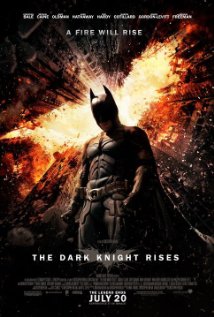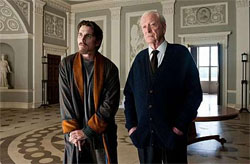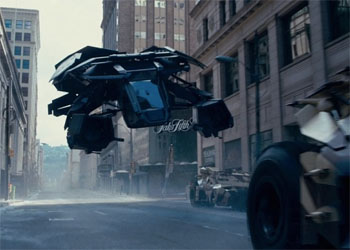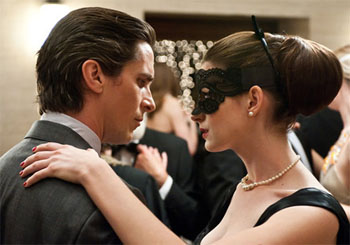 The Dark Knight Rises (2012, Dir. Christopher Nolan):
The Dark Knight Rises (2012, Dir. Christopher Nolan):
It’s been a dozen years since Memento, the shoestring-budget thriller that made a name for Christopher Nolan, and it’s been nearly that long since we’ve been allowed to feel good about anything, what with terrorist attacks, wars and economic collapses. Nolan’s preoccupation with isolated, obsessive, deluded heroes in films like Insomnia and The Prestige has since found a match with our current-day anxieties, in which the only sane option in an insane world seems to be to, well, go a little crazy (as the old-time movie trailer guy might say, “In a world gone mad…”). Who better than Nolan to helm the Batman franchise in these “feeling bad while doing good” times?
But has Nolan gone a little crazy himself? His first Batman movie Batman Begins (2005) was a welcome resuscitation of the hero for a tougher age, a comic book with teeth, while The Dark Knight (2008) flirted with more portentous issues like law, order and justice in a post-9/11 society, and the nature of good and evil: think philosophy bull sessions sandwiched between action scenes involving men in capes, makeup, and CGI-ravaged faces. And now comes The Dark Knight Rises, which goes all-in on just about everything on everyone’s mind right now, including but not limited to the Stock Market crash and class warfare, the ongoing debate about civil and personal responsibility, the viability of the hero myth in today’s mucked-up world, all of it stretched out to nearly three hours, with a ticking atomic bomb as the cherry on top.
Comics have often been about the issues of the day (ergo, the recent gay Green Lantern), and some might say we should be thankful a director with Nolan’s ambitions is at the helm of a superhero movie, especially when you look at some of the alternatives. Yet Nolan’s approach has always been at odds with the pulpiness of the material: wanting to have his cake and eat it too, he demands that Batman and his milieu be taken seriously, pulling out every trick in his bag to make it so (“important” themes, earnest actors, practical effects and settings, soaring David Lean-like shots of cityscapes) even as it clashes with the fundamental absurdity (not to mention the visceral kick) of a man in cowl and tights kicking Crime’s ass. Dark Knight rises? More like Dark Knight sinks under Nolan’s commitment to “reality” (whatever that means in this context), like Atlas with the globe on his shoulders.
 The center no longer holds in The Dark Knight Rises. With each successive film, as budgets have ballooned and plots have slackened, the reason for this whole enterprise — giving Batman psychological (psychotic?) depth — has fallen by the wayside. As Nolan ladles out half-baked Big Ideas amidst cluttered scenes of combat and chaos, driven forward by Hans Zimmer’s now thunderously familiar score, and the spectacle explodes across the screen, you wonder: how about coherent story and characters? Forget it Jake, it’s Sequeltown. Sidestepping the conclusion of The Dark Knight, in which Bruce Wayne (Christian Bale, more clenched than ever) accepted his destiny as Batman, this time around Bruce is a Howard Hughes-like figure moping around his mansion, retired from the Bat-life for reasons never convincingly presented, a pose in search of a character. Sure enough, he must return from the shadows to defend his city against Bane (Tom Hardy), a brawler encased in a breathing apparatus that can’t mask a plummy accent. Bane is a ferocious combatant, he wants to make Gotham suffer before he destroys it, and — well, let’s just say that Bane is pure evil, because that’s about as much nuance as you’ll get in Christopher and Jonathan Nolan’s schematic script, in which characters are pieces on a chess board rather than flesh-and-blood avatars, and every piece of dialogue is restricted to exposition, statement of purpose, or character self-identification.
The center no longer holds in The Dark Knight Rises. With each successive film, as budgets have ballooned and plots have slackened, the reason for this whole enterprise — giving Batman psychological (psychotic?) depth — has fallen by the wayside. As Nolan ladles out half-baked Big Ideas amidst cluttered scenes of combat and chaos, driven forward by Hans Zimmer’s now thunderously familiar score, and the spectacle explodes across the screen, you wonder: how about coherent story and characters? Forget it Jake, it’s Sequeltown. Sidestepping the conclusion of The Dark Knight, in which Bruce Wayne (Christian Bale, more clenched than ever) accepted his destiny as Batman, this time around Bruce is a Howard Hughes-like figure moping around his mansion, retired from the Bat-life for reasons never convincingly presented, a pose in search of a character. Sure enough, he must return from the shadows to defend his city against Bane (Tom Hardy), a brawler encased in a breathing apparatus that can’t mask a plummy accent. Bane is a ferocious combatant, he wants to make Gotham suffer before he destroys it, and — well, let’s just say that Bane is pure evil, because that’s about as much nuance as you’ll get in Christopher and Jonathan Nolan’s schematic script, in which characters are pieces on a chess board rather than flesh-and-blood avatars, and every piece of dialogue is restricted to exposition, statement of purpose, or character self-identification.
 As Batman and Bane’s face-off reaches city-shaking proportions, the implausibilities mount. How about the entire police force of Gotham trapped underground for five months? Or Bane’s plot to give Gotham’s inhabitants false hope under the guise of bringing “power to the people,” even though said people have just witnessed Bane blow up a football field with all the players on it? In The Dark Knight, the late Heath Ledger’s Joker played similar games with the population, but at least we saw enough faces of ordinary citizens for the shenanigans to have some weight. Here, Nolan shoots for something on the scale of A Tale of Two Cities (which is quoted in the film) but he’s no Dickens when it comes to painting a broad canvas, and intimate character work is at the level of Batman and Bane trying to punch each other out. For a series that focuses constantly on the question of balance when it comes to order and anarchy, The Dark Knight Rises is strangely off-kilter: plenty of running time is wasted on convoluted, ultimately nonessential subplots just to set up some vague jibes about the 99-percenters. Repetitive, too: Bruce must recover and rise as Batman not once but twice during the narrative.
As Batman and Bane’s face-off reaches city-shaking proportions, the implausibilities mount. How about the entire police force of Gotham trapped underground for five months? Or Bane’s plot to give Gotham’s inhabitants false hope under the guise of bringing “power to the people,” even though said people have just witnessed Bane blow up a football field with all the players on it? In The Dark Knight, the late Heath Ledger’s Joker played similar games with the population, but at least we saw enough faces of ordinary citizens for the shenanigans to have some weight. Here, Nolan shoots for something on the scale of A Tale of Two Cities (which is quoted in the film) but he’s no Dickens when it comes to painting a broad canvas, and intimate character work is at the level of Batman and Bane trying to punch each other out. For a series that focuses constantly on the question of balance when it comes to order and anarchy, The Dark Knight Rises is strangely off-kilter: plenty of running time is wasted on convoluted, ultimately nonessential subplots just to set up some vague jibes about the 99-percenters. Repetitive, too: Bruce must recover and rise as Batman not once but twice during the narrative.
You can make a good argument that all of these faults are similar to those in The Dark Knight. The differentiator is Ledger, whose Joker was (no pun intended) a true wild card; sensing that his character would only come alive when totally unhinged from the dictates of the Nolan brothers’ script, he ad-libbed and hammed his way right to the precipice, his unpredictability the ghost in an otherwise suffocatingly rigid machine. This time, no one in the cast is given even a ghost of a chance to do the same: Marion Cotillard is wasted as a Wayne Enterprises board member with a yen for the boss and her own agenda, while Michael Caine and Morgan Freeman are wheeled on and off-stage without much impact. Nolan seems to have more empathy for the common-man types like Gary Oldman’s Commissioner Gordon (an underrated strength of the trilogy) and Joseph Gordon-Levitt’s rookie cop John Blake; orphaned and burning to do good like Wayne, Blake’s destiny is telegraphed from a mile away, but his final scenes put a nice period on the saga.
 And then there’s Anne Hathaway as Selina Kyle, aka Catwoman (she’s not referred to in the movie as “Catwoman” — perhaps using that moniker would have interfered with Nolan’s “realism” directive somehow), re-imagined as a film noir femme fatale with martial arts flair. Coming after a string of mediocre love interests for Bruce in the previous films, Selina’s arrival is like a cool glass of water in the face. She is the only character in the piece with something resembling a sense of humor, and Hathaway and her above-it-all detachment is perfect for the role; even when she is reduced to a plot pivot, she maintains a wisp of mystery about her, the feeling that she can walk out of the movie and into her own story at any moment. “Come with me,” she says to Batman before the final cataclysm, offering him a way out from martyrdom, and in a curious frisson, we think: Yeah, why not? To heck with all this doomy superhero crap.
And then there’s Anne Hathaway as Selina Kyle, aka Catwoman (she’s not referred to in the movie as “Catwoman” — perhaps using that moniker would have interfered with Nolan’s “realism” directive somehow), re-imagined as a film noir femme fatale with martial arts flair. Coming after a string of mediocre love interests for Bruce in the previous films, Selina’s arrival is like a cool glass of water in the face. She is the only character in the piece with something resembling a sense of humor, and Hathaway and her above-it-all detachment is perfect for the role; even when she is reduced to a plot pivot, she maintains a wisp of mystery about her, the feeling that she can walk out of the movie and into her own story at any moment. “Come with me,” she says to Batman before the final cataclysm, offering him a way out from martyrdom, and in a curious frisson, we think: Yeah, why not? To heck with all this doomy superhero crap.
Maybe Nolan senses that he’s finally bitten off more than he can chew, even as he tries to have his cake and eat it too at the finish: Batman must become a hero once more, and Bruce Wayne must walk away from it all to be his own man again. It is as if Nolan himself has been trying on the Batman cowl, using it as an excuse to parade his pet themes and musings on society at large, and now as it threatens to get too big for him and his britches he is walking away. The Dark Knight Rises is the weakest of the Nolan Batmans, but somehow in its off-hand acknowledgment of its over-bigness it’s the most endearing. The sunny conclusion might seem inappropriate, even as it suggests routes for future Nolan-less sequels, but in surrendering to the possibility of happiness, Nolan makes his most radical move yet.

